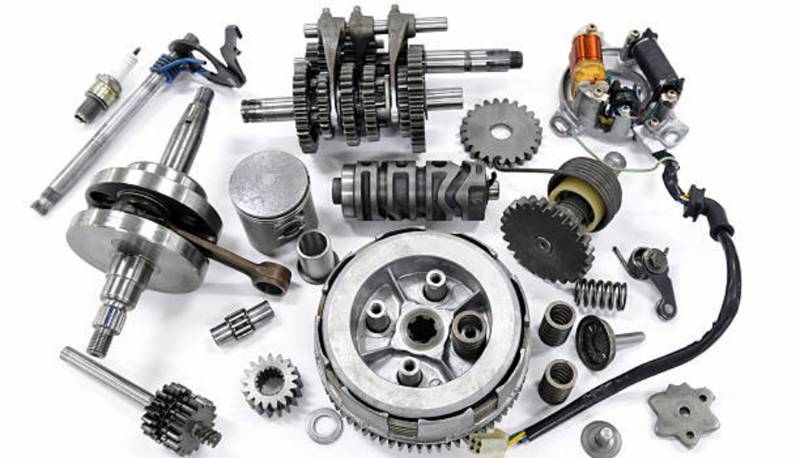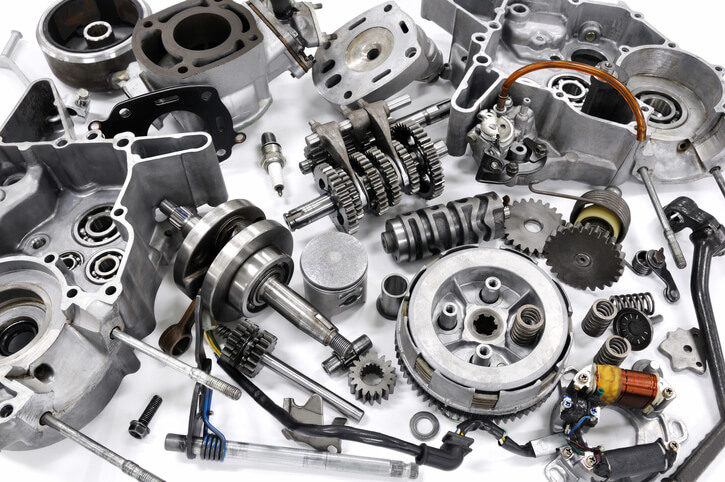Do This First When Your Motorcycle Parts Auckland Start Showing Wear
Do This First When Your Motorcycle Parts Auckland Start Showing Wear
Blog Article
Discover the Vital Motorcycle Components You Required for Ideal Efficiency
Understanding the vital parts of a motorcycle is fundamental for achieving peak performance. Each component, from the engine to the stopping system, plays an essential duty in overall functionality and safety and security. Routine upkeep can protect against unanticipated failings and improve the riding experience. Many riders ignore the ins and outs of these systems. Discovering exactly how they work together can lead to a much more effective experience. What crucial parts should every motorcyclist focus on?
The Engine: The Heart of Your Motorcycle
The engine serves as the core part of a bike, driving its efficiency and specifying its capacities. It is in charge of converting gas into mechanical power, which powers the bike ahead. Various kinds of engines are utilized, consisting of single-cylinder, V-twin, and inline configurations, each offering distinctive qualities matched for different riding purposes and styles. The engine dimension, typically determined in cubic centimeters (cc), substantially influences performance, with bigger engines usually supplying more power and torque.Furthermore, the engine's style and technology, such as fuel shot systems or air-cooling versus liquid-cooling, impact effectiveness and reliability. Upkeep is important for peak operation; elements like regular oil changes and monitoring ignition system assurance longevity. Motorcyclists frequently take into consideration an engine's responsiveness and smoothness, as these attributes boost the total riding experience. Eventually, the engine continues to be an essential component that specifies not only the motorcycle's efficiency but additionally the rider's connection to the machine.
The Transmission: Shifting Gears Efficiently
The transmission plays a crucial role in a motorbike's efficiency, specifically in the auto mechanics of gear shifting. Comprehending exactly how to move gears efficiently can boost the overall riding experience, while routine upkeep guarantees peak functionality. Appropriate interest to these elements can significantly impact the durability and effectiveness of the bike.

Gear Shifting Mechanics
Smooth equipment shifting is vital for optimal motorcycle efficiency, considerably influencing both acceleration and control. The mechanics of gear moving include the interaction in between the clutch, gear bar, and transmission system. When a motorcyclist engages the clutch, it disengages the engine from the transmission, permitting a gear modification without harming the elements. A well-timed release of the clutch, incorporated with specific motion of the gear bar, promotes a seamless adjustment in between gears. This procedure guarantees that the engine operates within its best power band, enhancing performance. Motorcycle Spares Christchurch. Furthermore, understanding the equipment proportions and their impact on speed and torque can help motorcyclists make notified selections throughout changes, ultimately contributing to a much more delightful and receptive riding experience
Maintenance Tips Significance
Routine maintenance plays an important role in guaranteeing that the transmission system runs efficiently, enabling for smooth gear shifts. Routinely inspecting and altering the transmission fluid is important, as old liquid can cause boosted friction and wear. Furthermore, evaluating the clutch for wear guarantees peak interaction and disengagement, preventing slippage throughout gear changes. Lubrication of moving parts is equally essential to reduce friction and boost efficiency. Motorbike proprietors must likewise keep an eye on for leaks and unusual noises, as these can indicate underlying issues. By adhering to these upkeep ideas, riders can lengthen the lifespan of their transmission system, guaranteeing that equipment changes stay seamless and adding to the general performance of their motorbike.
The Braking System: Ensuring Security on Every Ride
Braking systems are basic elements that straight affect a motorcycle's safety and security and efficiency. They include various components, including brake pads, rotors, calipers, and hydraulic lines, all collaborating to assure reliable deceleration. The sort of stopping system-- normally either disc or drum-- affects responsiveness and quiting power.Regular maintenance is necessary to copyright peak performance; worn brake pads can bring about decreased efficiency and increased stopping ranges. Additionally, the high quality of brake fluid should be monitored, as it can absorb dampness over time, jeopardizing braking efficiency.Riders ought to also take into consideration the relevance of anti-lock stopping systems (ABDOMINAL), which avoid wheel lockup throughout sudden quits, improving overall safety. Appropriately working brakes are not simply regarding quiting; they infuse self-confidence in the motorcyclist, enabling more secure navigating via numerous surfaces. Eventually, a trusted braking system is important for enjoying every experience with assurance.
The Suspension: Enhancing Convenience and Control
A well-functioning suspension system greatly adds to a motorbike's total efficiency, enhancing the performance of the braking system. The suspension plays a significant function in soaking up shocks from unequal surfaces, ensuring a smoother experience while keeping tire call with the road. This call is necessary for both stability and control, permitting cyclists to browse edges with self-confidence and precision.Different kinds of shock absorber, such as telescopic forks or mono-shocks, supply varying degrees of comfort and handling. Properly tuned suspension enhances responsiveness, offering the biker with a more linked feeling to the motorbike. Normal maintenance checks are very important to establish the suspension components, consisting of dampers and springs, are functioning at their best. An effective suspension system not only elevates the riding experience but additionally adds to the longevity of other motorbike components by reducing wear and tear. Consequently, buying top quality suspension is essential for any severe motorcycle fanatic.
The Tires: Attaching You to the Roadway
Tires play a vital role in a motorbike's efficiency, serving as the primary link between the roadway and the cyclist. Understanding the various kinds of tires readily available can significantly impact handling and safety and security. In addition, routine maintenance is important to guarantee peak tire performance and longevity.
Tire Enters Explained
Just how do different tire kinds influence a motorbike's performance? Tire kinds play an important role in determining a motorbike's handling, hold, and security. Sporting activity tires, developed for high performance, deal enhanced grip and responsiveness on smooth roadways, making them optimal for competing and hostile riding. Conversely, exploring tires focus on toughness and convenience, giving a smoother experience for long-distance travel. Off-road tires, defined by their sturdy tread patterns, master grip on unpaved surfaces, suitable for adventure lovers. Additionally, dual-sport tires blend features from both off-road and on-road categories, dealing with functional riding demands. Ultimately, selecting the appropriate tire type is important for maximizing performance, making certain safety and security, and boosting the overall riding experience.
Upkeep Tips Offered
While riding when driving, maintaining excellent tire condition is vital for safety and security and efficiency. Regularly inspecting tire stress is necessary, as under-inflated tires can bring about bad handling and raised wear. It is advisable to inspect step depth regularly; used tires compromise hold and security. Furthermore, bikers ought to try to find indications of damage, such as cracks or lumps, which can suggest the demand for substitute. Rotating tires regularly ensures also wear, improving long life. Moreover, maintaining tires tidy from debris and avoiding excessive aesthetics can prolong their life-span. Maintaining proper positioning and equilibrium adds to come to a head performance, minimizing stress and anxiety on other bike parts. Following these upkeep pointers linked here will substantially boost the overall riding experience.
The Fuel System: Sustaining Performance and Efficiency
The gas system plays an important function in taking full advantage of a motorbike's performance and efficiency, as it assures the optimum distribution of gas to the engine. It comprises a number of essential elements, including the fuel container, fuel pump, fuel filter, and fuel injectors or carburetor. Each component must operate efficiently to assure a smooth and effective ride.The gas tank stores fuel and supplies it to the engine using the fuel pump, which creates the essential pressure. A gas filter protects against contaminants from getting in the engine, while the injectors or carburetor mix fuel with air for combustion.Proper upkeep of the fuel system is crucial; a clogged filter or malfunctioning injector can result in decreased efficiency and raised fuel consumption. By verifying that the fuel system operates successfully, bikers can appreciate better throttle feedback, better gas economy, and generally enhanced riding experience.
The Electrical System: Powering Your Experience
A reliable electrical find more info system is essential for the overall functionality and safety of a motorcycle, as it powers critical elements such as the ignition, lighting, and numerous electronic systems. This system includes the battery, which stores energy, and the alternator, accountable for generating power while the engine runs. The wiring harness links these parts, making sure trustworthy power distribution.Additionally, merges secure the system from overloads, while relays help regulate high-current devices with low-power signals. A well-maintained electrical system boosts efficiency by ensuring smooth starts and consistent procedure of lights and signals, vital for rider exposure and safety.Regular checks of the battery's cost and links are necessary for preventing electric failings. Cyclists need to additionally check circuitry for wear and tear, ensuring all components operate ideally. Ultimately, a robust electric system contributes significantly to the general performance and integrity of the motorcycle.
Regularly Asked Questions
Exactly how Often Should I Replace My Motorcycle's Battery?
The regularity of motorcycle battery replacement relies on usage and upkeep (Motorcycle Parts Auckland). Generally, batteries must be replaced every three to five years. Normal checks can aid recognize when a substitute is needed for peak efficiency
What Devices Do I Need for Basic Bike Maintenance?
For fundamental bike upkeep, one calls for vital tools such as an outlet set, wrenches, screwdrivers, pliers, tire stress gauge, and a torque wrench. These devices facilitate efficient maintenance and ensure the motorcycle runs successfully and safely.
Just How Can I Improve My Bike's Aerodynamics?
To enhance motorcycle aerodynamics, one must consider readjusting fairings, making use of windshield expansions, maximizing body setting, and reducing overall weight. These alterations help minimize drag, boosting stability and fuel efficiency during adventures.
What Are the Indications of a Failing Electric System?
Indicators of a falling short electric system include lowering lights, difficulty starting, uneven tool analyses, and blown merges. Bike Parts Wellington. Uncommon scents or corrosion around battery terminals may also show underlying concerns requiring instant interest for security and performance

Exactly how Do I Pick the Right Oil for My Motorcycle?
When selecting oil for a bike, one need to consider the maker's requirements, thickness rankings, and the kind of riding. Furthermore, standard versus artificial oil can impact efficiency and engine defense, affecting the choice substantially. The engine dimension, commonly measured in cubic centimeters (cc), significantly influences performance, with bigger engines normally giving even more power and torque.Furthermore, the engine's design and technology, such as fuel injection systems or air-cooling versus liquid-cooling, influence effectiveness and dependability. A well-functioning suspension system greatly adds to a motorcycle's general performance, complementing the effectiveness of the braking system. The gas system plays an important function in taking full advantage of a motorcycle's performance and effectiveness, as it ensures the optimal distribution of fuel to the engine. A gas filter avoids pollutants from going into the engine, while the injectors or carburetor mix fuel with air for combustion.Proper upkeep of the gas system is vital; a blocked filter or malfunctioning injector can lead to reduced efficiency and raised fuel intake. A well-maintained electric system boosts efficiency by guaranteeing smooth beginnings and regular operation of check my blog lights and signals, vital for cyclist exposure and safety.Regular checks of the battery's charge and connections are vital for stopping electric failures.
Report this page